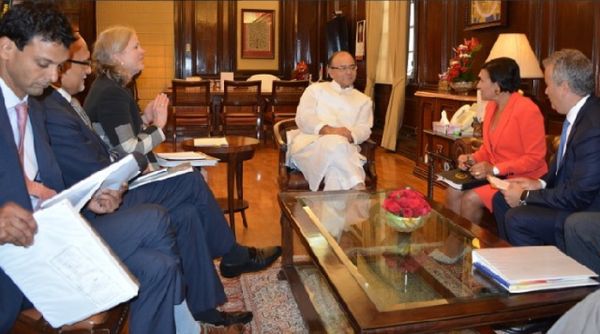
by admin | May 25, 2021 | Corporate, Corporate finance, Corporate Governance

K. Chandrashekhar Rao
Hyderabad : Proposing an unemployment allowance of Rs 3,000 per month ahead of elections, Telangana Chief Minister K. Chandrashekhar Rao on Friday presented a Vote-on-Account Budget for 2019-20 that has an estimated expenditure of Rs 1,82,017 crore, an increase of 4 per cent over the previous year.
Presenting the interim budget in the Assembly, KCR, as Rao is popularly known, said the GSDP growth rate of the state has doubled since its formation in 2014 and its Budget for the new fiscal showed a revenue expenditure of Rs 1,31,629 crore and capital expenditure of Rs.32,815 crore.
KCR said since the Union Government introduced a Vote-on-Account budget for the next year and as there was no clarity as to what would be the priorities for expenditure, the state government too was presenting interim budget.
“In 2019-20 the estimated revenue surplus is Rs 6,564 crore and fiscal deficit is Rs 27,749 crore,” Rao said in his budget speech.
The fiscal deficit is 2.81 per cent of Gross State Domestic Product (GSDP).
“State’s own revenues for Budget Estimate (BE) of 2019-20 are at Rs 94,776 crore in comparison with Revised Estimate (RE) of 2018-19 at Rs 72,777 crore.
Transfers from the Centre as per BE 2019-20 is Rs 22,835 crore, while in RE 2018-19 these are estimated at Rs 28,042 crore, he said.
“The growth rate of GSDP, at constant prices, was 4.2 per cent in the two years prior to state formation. By 2017-18, this accelerated by more than twice to 10.4 per cent.”
He also proposed Rs 1810 crore in the Budget to introduce unemployment allowance of Rs 3,016 per month to the eligible.
—IANS

by admin | May 25, 2021 | Corporate, Corporate finance, Corporate Governance, Corporate Jobs, Employment, Private Jobs
 New Delhi : With middle-class apathy on the rise, Finance Minister Arun Jaitley may double the income tax exemption threshold for the salaried from the present Rs 2.5 lakhs to Rs 5 lakhs while also reinstating tax-free status for medical expenses and transport allowance, providing some relief to the section already under strain since demonetisation.
New Delhi : With middle-class apathy on the rise, Finance Minister Arun Jaitley may double the income tax exemption threshold for the salaried from the present Rs 2.5 lakhs to Rs 5 lakhs while also reinstating tax-free status for medical expenses and transport allowance, providing some relief to the section already under strain since demonetisation.
Though propriety demands that not too many policy changes should be made in a vote on account budget, the BJP government is apprehensive of the possibility of a middle-class backlash in the impending general elections.
Hence the plan to streamline tax slabs, which in any case are in consonance with the coming Direct Tax Code, government sources told IANS.
The problem that may manifest itself is that the Union Budget will precede the unveiling of the Direct Tax Code Report on February 28. Tinkering with the tax rates before the release of the report will make it contentious.
The new Direct Tax Code will try to bring more assessees into the tax net, make the system more equitable for different classes of taxpayers, make businesses more competitive by lowering the corporate tax rate and phase out the remaining tax exemptions that lead to litigation. It will also redefine key concepts such as income and scope of taxation
At the moment, income up to Rs 2.5 lakh is exempt from personal income tax. Income between Rs 2.5-5 lakh attracts 5 per cent tax (see table), while that between Rs 5-10 lakh is levied with 20 per cent tax. Income above Rs 10 lakh is taxed at 30 per cent. Rs 5 lakh exemption is only applicable to individuals of over 80 years.
Also, tax free medical expenses up to Rs 15,000 and transport allowance up to Rs 19,200 per annum has been replaced with a Rs 20,000 standard deduction for those earning above Rs 5 lakh last year. This will benefit tax payers to the tune of Rs 12,500 annually which is not much but can be viewed as a sentiment buster.
A fatigued BJP dispensation realises that as the incumbent it will have to fight off varied challenges.
With acute farm distress, middle class backlash, massive spike in unemployment data and rising Dalit anger taking its toll on the BJP, it would like to unleash a slew of course correctives. The 10 percent quota for upper castes was part of this process to appease vote banks. But this was an executive decision adopted by parliament, tinkering with the tax structure similarly is a legislative decision.
Income Tax Slabs for Individual Tax Payers & HUF (Less Than 60 Years Old) for FY 2018-19 –
Income Tax Slabs Tax Rate
Income up to Rs 2,50,000* No tax
Income from Rs 2,50,000 – Rs 5,00,000 5%
Income from Rs 5,00,000 – 10,00,000 20%
Income more than Rs 10,00,000 30%
—IANS


